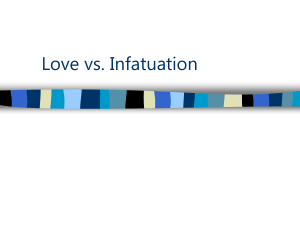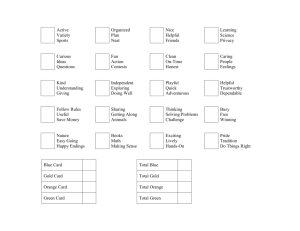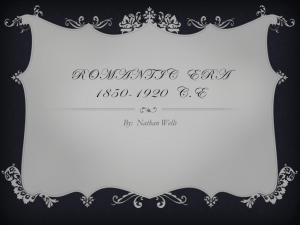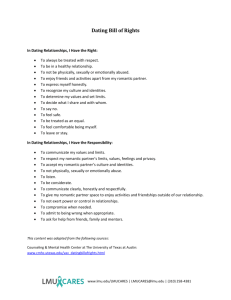Altered brain chemistry
advertisement
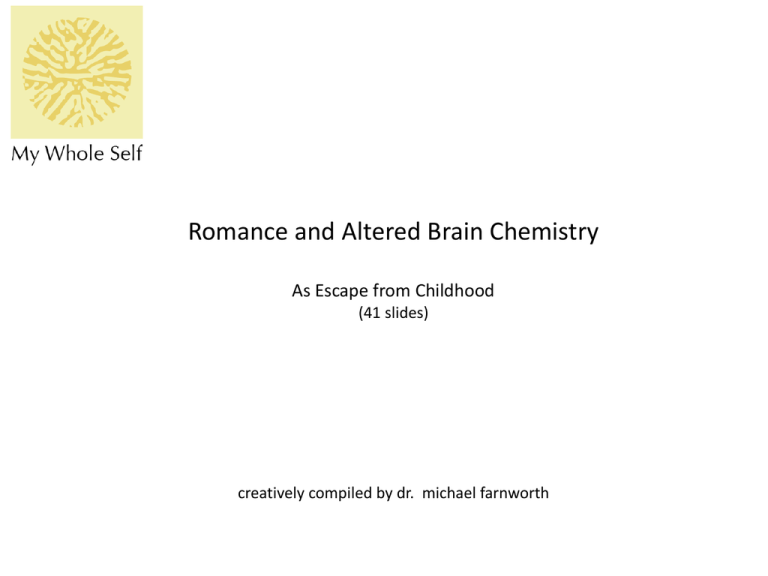
Romance and Altered Brain Chemistry As Escape from Childhood (41 slides) creatively compiled by dr. michael farnworth Early childhood experience shape the neurological structure of the brain and it’s functions. Repetition creates the slippery slopes of brain functions. The stronger the energy the stronger the neural and synaptic pathways. The message of our culture... “Fall in love with the right person and you will live happily ever after.” Love in the Western World, Denis de Rougemont For most people living in the west today, falling in love is literally the one ecstatic, mystical experience left open and it serves as a haven from the culture of repression and control. Romantic love as love object of the old (reptilian) brain… We don’t fall in love with an individual we fall in love with a type or an image. When this image is realized we fall into love. It is easy, automatic, and requires no effort on our part because we are not in charge. Our childhood templates are calling the shots. How many of you believe in love at first sight? The business of love at first sight Love at first sight is a very real and powerful phenomenon. It is only destroyed by seeing them again and again and again and again. A question of love If I cause your feelings of love for me by my nice behavior towards you. And you cause my feelings of love for you by your nice behavior towards me. Then, when I say “I love you” what does that really mean? Romantic love said another way... Listen and listen well, as long as you please me and do what I want, I'll stick around. But if you mess up and disappoint me or otherwise make me mad then I'm out of here. Understand. I don’t have to put up with your sh**! Romantic love seeks to possess it’s desires. It only gives to receive! Romantic love is a selfish love. Desiring only to fulfill it’s own wishes and fantasies. The “track record” romantic love... Divorce rates: 40-60% Separation rates: 3-5% Abandonment rates: 6-8% The mystical experience... Can we even start to appreciate the euphoric sense of wholeness that the old brain anticipates at finding someone to reclaim the completeness, and oneness of the self. No wonder we come alive when falling in love! Our attraction to another... Will be based on a mutual tolerance for intimacy. We are drawn to someone as wounded or as healthy as we are. We greatly increase our chances of a happy marital adventure by becoming healthier human beings before we make our selection! We need to comprehend the origins of the image Our hungers... Our romance fantasies... Our addictions... Our wounds... Our fears... Our role playing... Our dishonesties... Our childhoods... Falling in love We do not fall in love with an individual, but rather we fall in love with an image, type or fantasy that the individual represents and triggers within us. “The image” The practice of focusing upon the visual image and failing to see the reality behind the image is a well known phenomenon. The appearance becomes more important than the essence of who the person is, but it is enough to trigger the neural templates… The stage is set... Once the needs of the old brain’s energies and feelings are realized in the security and safety of another’s image (triggering the comforting template) Then the new brain will obsess and focus the attention upon that image; often at the cost of reality and common sense. The chemistry of love... When we fall into love the brain is triggered to release neuro-transmitters which create a euphoric feeling of well being. Dopamine, norepinephrine, seratonin are the magical chemistry ingredients of love. Fran Lebowitz suggests... Romantic love is mental illness, but it is a pleasurable one. It’s a drug. It distorts reality and that’s the point of it. It would be impossible to fall in love with someone that you really saw. Falling in love is like doing drugs. The neuro-transmitters: Creates euphoria… Lowers defenses…. Energizes… Raises libido… The sexual attraction feelings are enhanced by danger and risks (enter bad boy syndrome) Infatuation stage... Altered brain chemistry contributes to faulty judgment that is fueled by shallow love and infatuation. When two people with altered brain chemistry get married then these societies (which base matrimony on infatuation and romantic love) have a troubled track record of stability and longevity. The familiar language of love and age regression triggered by comforting neural templates... When I'm with you, I no longer feel alone; I feel whole and complete...Recovery of self. I love you so much I can’t live without you...Survival transference. I’m going to love you more than anybody ever has...Finally my needs are going to be met. The familiar language of love, age regression and triggered neural templates… I know we’ve just met, yet somehow I feel as though I already know you...De’ja’vu. This is peculiar, but even though we’ve been seeing each other only for a short time, I can’t remember a time when I didn’t know you...Timelessness. From Getting the Love You Want, Harville Hendrix Regressive child like behaviors and feelings... Fears, feelings and behaviors of childhood appear in our adult intimate relationships. Conflict and angry energies often set them off. Men run away, lose it, get violent Women cry, get depressed, withhold Some times an addictive emotional hunger can masquerade as love. When someone has mood altered all their life they can easily get mixed up about the energies that falling in love can create. Love is not an addiction Loving and intimate behaviors are not addictive in nature. They stand apart. Additive states may mimic love but will never sustain it. Please beware of how addictive states can masquerade as love but are poor, deprived counterfeits of it. Sexual addicts…Come on Romance addicts…Move on Relationship addicts... Hang on Addictions cut us off from our own body and our own truth. Self differentiation is the key The more love you feel for another, the more selfdifferentiation will be required for that love. If your self-differentiation can’t keep up with your love, emotional gridlock will occur. The two kinds of intimacy Self created and validated intimacy: self confrontation, exploration and discovery; strong grounded sense of self and unilateral disclosure of self. Other created and validated intimacy: dependence on; mirrored/reflected sense of self; control of other to meet our needs. I don’t respect myself. I can’t respect anyone who respects me. I can only respect someone who does not respect me. I respect Jack because he does not respect me. I despise Tom because he does not despise me. Only a despicable person can respect some one as despicable as me. I cannot love someone I despise. R.D. Laing The principle of least interest... a game Who ever has the least amount of interest in a relationship controls it. And has much more power than the other who may have a whole lot more invested in it! The principle of least interest in romantic relationships: A throw back to childhood… When you attempt to secure someone’s love and attention when they are being inattentive and aloof. It can be quite pathetic when trying to garner someone else’s affection with our performance and good behavior when they have no interest. The energy and interest is doubly compounded when our interest is not returned by the other. Have you ever wondered why so many females come to reject the nice guy? You’re familiar with the scenario: A nice, attentive and attractive guy is vying for a female’s attention and she is just not interested. But why? Because he’s just too nice. Go back and reread the previous slide written by R.D. Laing. Boredom as disassociation Boredom is a defense mechanism and is used to still the anxiety of the unfamiliar. When love, affection and attention is unfamiliar to you, you disassociate. (say in the case of a nice guy who is attentive and really into you) You are in unfamiliar territory so there is anxiety and to deal with the anxiety you become bored as a way to protect yourself. (something is terribly wrong with this guy who likes me too much) Enter the bad boy syndrome! It may be instructive that many are anxious in a safe, attentive and loving relationship. Their neural templates from childhood are imprinted for a certain amount of hurt, rejection, inattention and instability. The unfamiliar is threatening and anxiety producing. Risk enhances the love. the end
